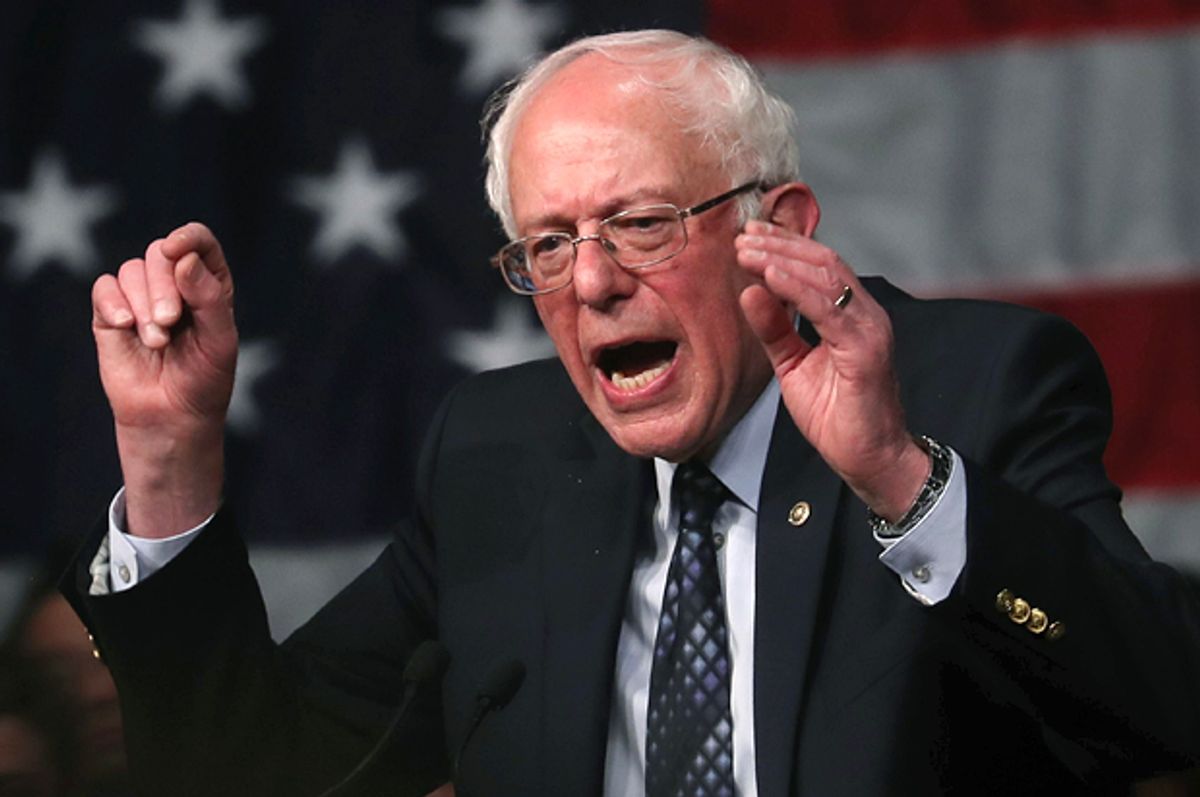The Democratic race inched a little closer to its conclusion yesterday. Hillary Clinton appears to have won Kentucky by the narrowest of margins (46.8 percent to 46.3 percent), while Bernie Sanders won Oregon by close to ten points (54 percent to 45 percent). Like many of the recent primaries, Kentucky and Oregon are mere formalities at this point. Clinton and Sanders will essentially split the delegates. Given Clinton's near-insurmountable lead, that amounts to another win for her campaign.
The race is over. Hillary Clinton will be the nominee. We've known this for several weeks now. Last night, Sanders declared that he plans to campaign “until the last ballot it cast,” and that's what he should do. He has every right to remain in the race and allow primary voters in the remaining states to vote for their preferred candidate.
The calls for Sanders to bow out now are misguided. However, there are growing concerns that Sanders's reality-defying pronouncements are needlessly hurting the party – and his credibility. Vox's Jeff Stein notes that “40 percent of his [Sanders] supporters don't think Hillary Clinton is the most likely person to become the Democratic Party's nominee” in part because Sanders “keeps saying things like the 'campaign is going to the Democratic National Convention' and that the race 'is not yet over.'”
The question of how Sanders should campaign admits of no easy answers. There's a thin line between obligatory optimism and outright delusion. It's one thing to continue pounding your message and even challenging Clinton (that's healthy, in fact), but it's quite another to pretend there's a path to the nomination when you know there isn't, especially in this charged climate.
The resentment among Sanders supporters has reached a boiling point, as the chaos in Nevada illustrated, and it's not clear that anger will subside in time to unify the party. What he says and does at this stage is hugely consequential. In a statement released after Nevada, Sanders made a clear decision to double down:
“The Democratic Party has a choice. It can open its doors and welcome into the party people who are prepared to fight for real economic and social change – people who are willing to take Wall Street, corporate greed and a fossil fuel industry which is destroying the planet. Or the party can choose to maintain its status quo structure, remain dependent on big-money campaign contributions and be a party with limited participation and energy.”
There's nothing wrong with the substance of these remarks. The tone is unmistakable, though. Against the backdrop of a fractured party, Sanders is showing no interest in bridging the divide – not yet, at least. I'm not sure that's wrong either, but it is more questionable alongside his unrealistic claims about his prospects for victory.
Josh Marshall put it forcefully: “Sanders narrative today has essentially been that he is political legitimacy. The Democratic Party needs to realize that. This...is the problem with lying to your supporters. Sanders is telling his supporters that he can still win, which he can't. He's suggesting that the win is being stolen by a corrupt establishment, an impression which will be validated when his phony prediction turns out not to be true. Lying like this sets you up for stuff like what happened over the weekend in Nevada.”
Kevin Drum, writing for Mother Jones, wonders if Sanders is succumbing to bitterness: “Before this campaign, he was a gadfly, he was a critic of the system, and he was a man of strong principles. He still is, but he's also obviously very, very bitter...By all objective measures he did way better than anyone expected and had far more influence than anyone thought he would, and he should feel good about that. Instead, he seems more angry and resentful with every passing day.”
Sanders's critiques of the Democratic establishment are more legitimate than Marshall suggests, and what Drum calls bitterness many would call righteous indignation, but they both have solid points: Sanders is going to lose and it won't be because the DNC stole it from him. It will be because more people voted for Clinton.
Eventually, Sanders will have to yield to reality, as will his supporters. He can be honest about his prospects without sacrificing his broader message and movement. With Trump waiting in the wings, the stakes are high. It would serve Sanders and the party well to be less “scorched earth” and more measured in the weeks ahead. I've said, and continue to believe, that Sanders is right to advance his core themes until the convention, and that he should use what leverage he has to influence the party's platform, but that can be done without misleading his supporters or allowing his "revolution" to be subsumed by grievance politics.

Shares